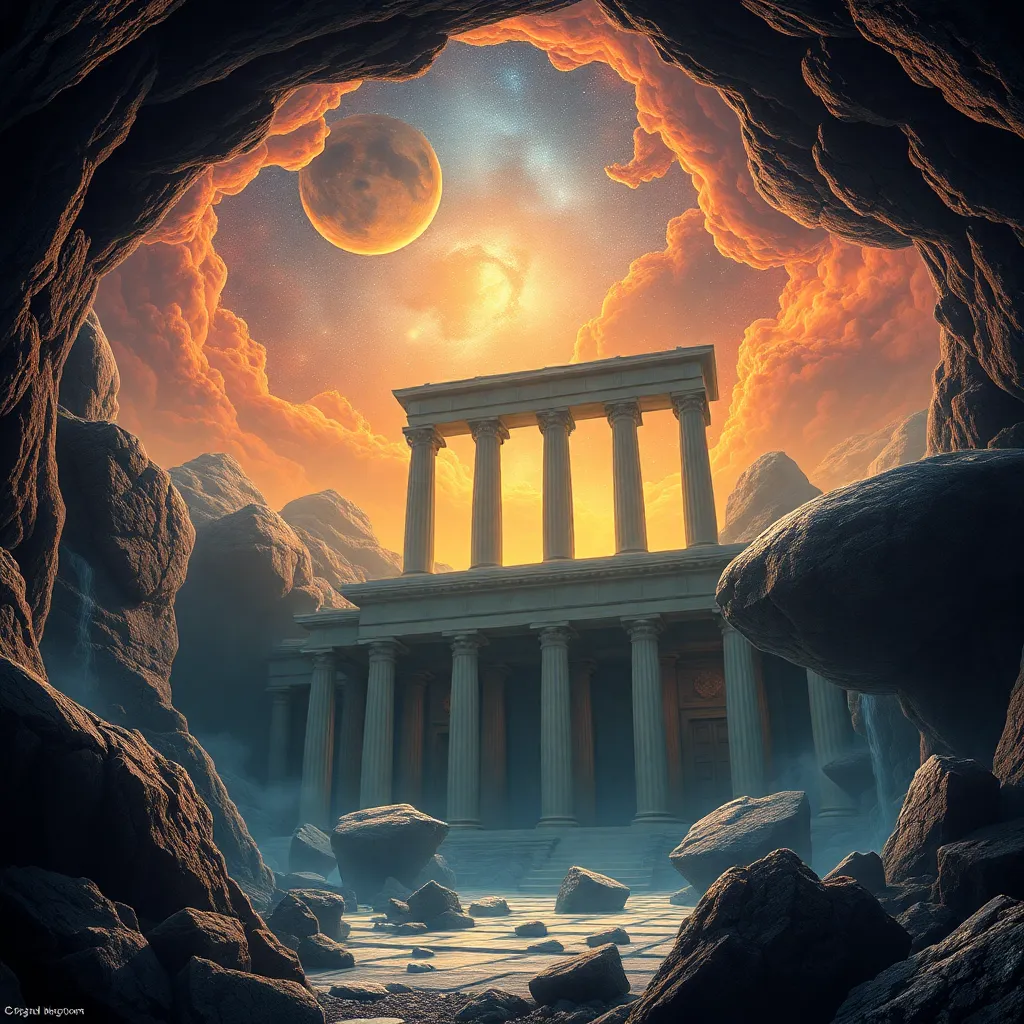The Underworld and Its Influence on Ancient Greek Science and Cosmology
I. Introduction
The Underworld, known as Hades in Ancient Greek mythology, represents the realm of the dead and a vital aspect of the Greek understanding of life, death, and the afterlife. It is a complex domain filled with various regions that reflect the beliefs and values of Ancient Greek culture.
The significance of the Underworld extends beyond mere mythology; it serves as a crucial element in shaping the philosophical and scientific inquiries of the Greeks. This article aims to explore the multifaceted concept of the Underworld, its representation in Greek thought, and its impact on early scientific and cosmological frameworks.
II. The Concept of the Underworld in Greek Mythology
In Greek mythology, the Underworld is often depicted as a vast and shadowy realm ruled by Hades, the god of the dead. It consists of various regions, each with distinct characteristics:
- Elysium: A paradise for the souls of the heroic and virtuous, where they enjoy eternal bliss.
- Tartarus: A deep abyss used as a dungeon of torment for the wicked, where punishment is meted out.
- The Asphodel Meadows: A neutral area where ordinary souls wander, neither rewarded nor punished.
Key figures associated with the Underworld include:
- Hades: The ruler of the Underworld, often misunderstood as a malevolent figure.
- Persephone: The queen of the Underworld, who spends part of the year above ground and part in the Underworld.
- Charon: The ferryman who transports souls across the river Styx, the boundary between the living and the dead.
The Underworld symbolizes not only death but also the cycle of life, illustrating the Greeks’ complex relationship with mortality and the afterlife.
III. The Underworld in Early Greek Philosophy
The Underworld significantly influenced early Greek philosophers, particularly pre-Socratic thinkers like Heraclitus and Pythagoras, who pondered the nature of existence and the soul. Their reflections often touched on the idea of the soul’s immortality and its journey after death, echoing the themes found in mythological narratives.
In the works of Plato, the Underworld takes on a profound philosophical role. In his dialogues, particularly in “The Republic,” Plato introduces the concept of the Forms, suggesting that the material world is a shadow of a higher reality. The Underworld serves as a metaphor for the realm of the Forms, where the true essence of things resides, separate from the transient physical world.
Furthermore, the Underworld’s implications on life and existence prompted discussions about ethics, justice, and the consequences of human actions, reinforcing the belief that one’s deeds in life directly influence their fate in the afterlife.
IV. The Underworld’s Impact on Ancient Greek Science
The interplay between myth and science in Ancient Greece is evident in how the Underworld informed early scientific thought. The Greeks did not see a strict division between mythology and rational inquiry; rather, they integrated both to understand the world around them.
Views on the nature of the soul were especially influenced by concepts of the Underworld. Philosophers like Plato argued for the soul’s immortality, positing that it exists before birth and continues after death, traversing the Underworld in search of knowledge and truth.
The Underworld’s structure and its metaphysical implications influenced early cosmological models. For example, the Greeks envisioned a cosmos with a hierarchy, where the heavens and the Underworld were opposites, reflecting the balance of existence.
V. Cosmological Interpretations of the Underworld
The Underworld is often viewed as a counterpart to the heavens. While the heavens were associated with light, order, and the divine, the Underworld represented darkness, chaos, and the unknown. This duality mirrors the Greek understanding of the universe as a balanced system.
Connections between the structure of the Underworld and the universe were prevalent in Greek thought. The Underworld was often depicted as a vast expanse beneath the earth, while the heavens were seen as an infinite space above. This spatial relationship influenced later astronomical theories, as thinkers sought to understand the cosmos in a holistic manner.
VI. Literary Reflections of the Underworld in Scientific Thought
Key literary texts from ancient Greece, such as those by Homer and Hesiod, provide insight into the Underworld’s role in shaping scientific thought. In “The Iliad” and “The Odyssey,” Homer presents vivid descriptions of the Underworld and its inhabitants, reflecting cultural beliefs about death and the afterlife.
Hesiod’s “Theogony” and “Works and Days” also delve into themes of mortality and the divine order of the cosmos, using allegory and metaphor to explore complex ideas. These narratives contributed to a cultural framework that shaped scientific inquiry, encouraging thinkers to explore the mysteries of existence.
Moreover, playwrights like Aeschylus and Sophocles incorporated elements of the Underworld in their works, highlighting moral lessons and the human condition, further intertwining mythology with philosophical and scientific explorations.
VII. The Legacy of the Underworld in Hellenistic and Roman Thought
The concepts of the Underworld underwent significant evolution during the Hellenistic period, influencing scientific thought and philosophy. Hellenistic scholars integrated earlier ideas with new discoveries, leading to a more nuanced understanding of the cosmos.
In Roman culture, the reinterpretation of the Underworld continued, with figures like Virgil in “The Aeneid” presenting their own visions of the afterlife. This adaptation allowed for a blending of Greek mythology with Roman values, enriching the cultural narrative surrounding death and the afterlife.
The legacy of the Underworld has lasting effects on Western philosophical and scientific traditions, serving as a reminder of the interconnectedness of mythology, science, and cosmology.
VIII. Conclusion
In summary, the Underworld in Ancient Greek mythology represents a complex interplay of beliefs about life, death, and the cosmos. Its significance extends from mythology into early philosophy and science, shaping the understanding of existence for generations.
The lasting impact of the Underworld on Greek thought emphasizes the importance of mythology in the development of scientific inquiry and cosmological models. Understanding this relationship enriches our perspective on how ancient cultures grappled with fundamental questions of existence, and it continues to influence contemporary interpretations of mythology and science.




